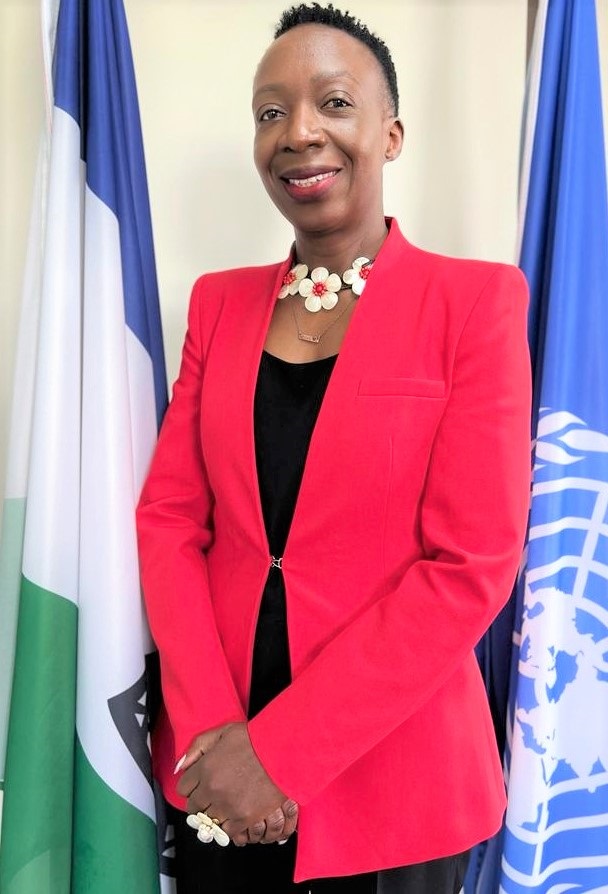Jacqueline Saline Olweya – The UNDP Resident Representative
Achievement of the Sustainable Development Goals (SDGs) has been stagnating and is of concern to policymakers and development practitioners in Lesotho. Other than the financing constraints, the Sustainable Development Report 2022, states that progress towards achievement of the SDGs has been undermined by the confluence of crises; with Climate Change, the COVID-19 pandemic, and the conflict in Ukraine being the most dominant.
Lesotho has been no exception; the country had already been facing stagnant economic growth before the COVID-19 pandemic and registered a decline in the annual growth rate from 3.6 percent in 2016 to 0.9 percent in 2019[1]. The country has annually, faced financing gaps to implement economic and social development priorities and to enable it to confront some of the challenges posed by the pandemic and climate effects.
In the financial year 2022/2023, the approved budget has projected a fiscal deficit of 3.3 billion Maloti which is equivalent to 7.7 percent of Gross Domestic Product (GDP).
In view of this, the Government of Lesotho has adopted the Integrated National Financing Frameworks (INFF), an approach recommended through the Addis Ababa Action Agenda to help countries to align the financing flows and policies with economic, social, and environmental priorities. The Ministry of Finance and Development Planning has been working with UNDP to conduct the initial milestones for establishing this as a framework for financing development objectives in Lesotho.
The INFF process is expected to strengthen planning processes and help Lesotho to overcome existing impediments to financing sustainable development. As a first step, the country conducted a Development Finance Assessment (DFA) in 2021, a diagnostic to determine financing gaps and opportunities, both domestic and international sources, as well as public and private finance. The ensuing INFF roadmap has recommended strategies and policy reform options to enable the country to increase investment, manage risks and achieve sustainable development priorities, as identified in the country’s national strategic development plan (NSDP II).
The Lesotho INFF roadmap was jointly launched in March 2022 by the then Honourable Minister of Finance and Minister of Development Planning. This demonstrated and reinforced the government’s commitment to achieving sustainable development targets, and to institutionalising effective public financing management systems and practices, which include aligning development and financing decisions, mobilization of partnerships, and improving accountability mechanisms.
The Lesotho DFA identified private sector financing as one of the potential financing resources that can be channelled towards sustainable development in Lesotho. However, the private sector in Lesotho is mainly Macro, Small, and Medium Enterprises (MSMEs) and only contributes around 20 percent to GDP.[2]
The government has therefore taken steps to learn and address some of the emerging constraints for promoting private sector participation, partnerships, and investments for the achievement of ‘private-sector-led growth and employment creation’, as aimed by NSDP II.
In this regard, the Government has conducted a country-wide private sector assessment to determine constraints to effective participation and support to sustainable economic activities. A total of 172 businesses across 30 private sector networks were reached and access to finance, and business skills gaps were some of the main obstacles mentioned by the private players. The assessment made some proposals to address the emerging challenges, and these will be consolidated into a private-sector development strategy.
To spotlight private sector opportunities, the government is conducting an SDGs Investor Map, identifying sectors and opportunities for mobilising public-private partnerships for high development impact. The Map is expected to help the government to translate the development objectives into private sector language to catalyse investment and mobilise partnerships in context. The Lesotho SDGs Investor Map has identified opportunities for private investment in five priority sectors, namely, Agriculture, Manufacturing, Renewable energy, Health, and Financial Services.
Further, Government officials and other key national stakeholders were trained on SDGs domestication implementation. The training raised awareness and enabled the national stakeholders to adopt and align their operations with the SDGs and national priorities.
With the aim of addressing challenges to monitoring, reporting, and oversight of SDGs and subsequent to the training, a specialized session targeting the parliamentary committee on SDGs was held with the purpose of building consensus on the SDG institutional and coordination structure to support SDG-aligned budgeting, implementation, monitoring, and reporting.
Efficient mobilization and management of development finance resources require strong and strategic partnerships and proper oversight mechanisms in place. In that regard, the Government of Lesotho has developed partnership frameworks to enhance collaboration in the implementation and financing of development priorities and the SDGs. The frameworks will promote partnerships between the Government of Lesotho with the civil society organisations, private sector, and development partners for consolidated efforts on development financing objectives and transparent use of public funds.
Currently, the Government is in the process of developing an integrated financing strategy to advance the operationalisation of the INFF. The financing strategy will translate the INFF roadmap into an integrated policy framework that will direct the Government of Lesotho on the mechanisms to better mobilize innovative financing flows and manage existing sources. The strategy will also recommend possible financing instruments that have the potential for use in the country to channel public and private investment into development initiatives.




